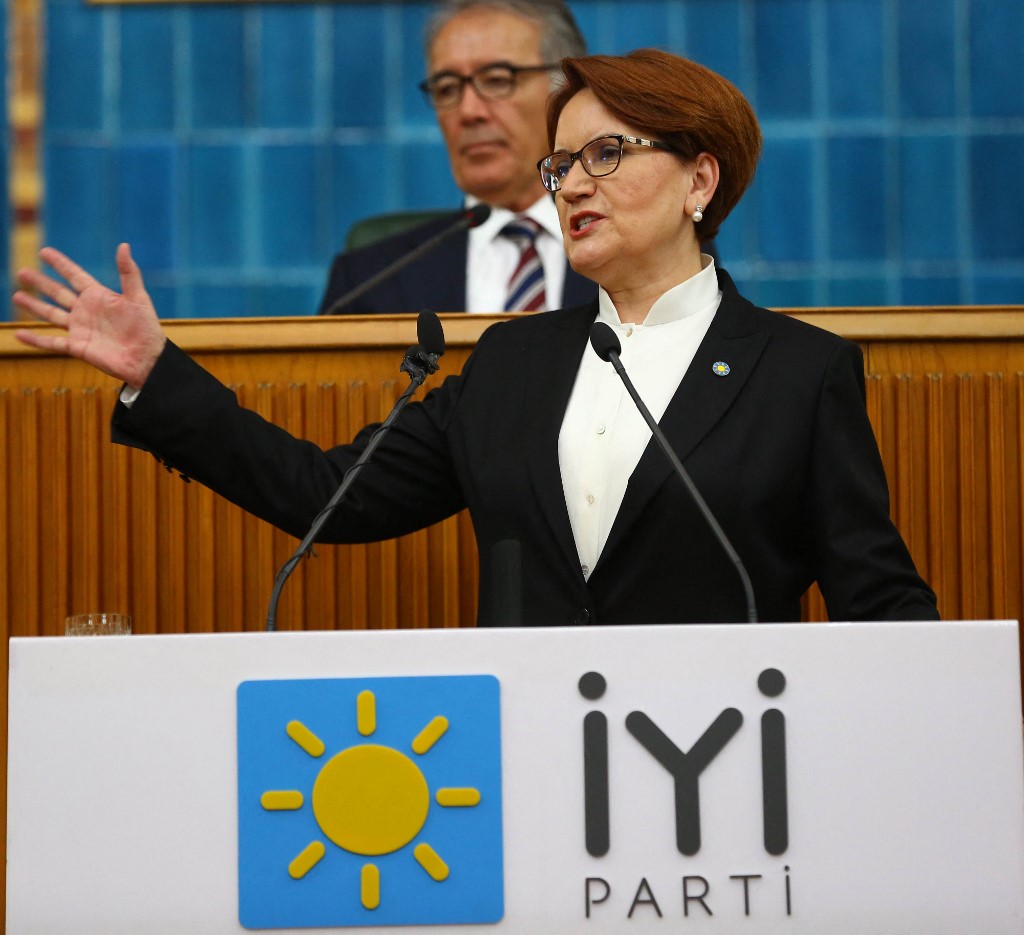Cevheri Güven
Meral Akşener, leader of the Good (İyi) Party, has been facing sexist insults in parallel to her rising popularity as evidenced by election polls. On Twitter, a hashtag campaign insinuated that she was a prostitute. The attacks also targeted her family members. In the face of all this, Akşener made a brave move and exposed the campaign in detail on the floor of parliament. The unexpected move further contributed to her popularity.
Semih Yalçın, deputy chairman of the Nationalist Movement Party (MHP), in a statement on March 4 referred to Akşener as “Fosforlu Cevriye,” in a reference to a character in an old Turkish novel that is often used as a euphemism for a prostitute.
Yalçın is a highly influential figure for the Grey Wolves, the party’s youth organization. In the past year, many politicians and journalists verbally targeted by Yalçın ended up suffering physical assaults by armed groups. Most recently, journalist Levent Gültekin was attacked by a mob of 20 people.
After Yalçın’s verbal attack on Akşener, the nationalist party’s İstanbul provincial network launched a social media campaign with the hashtag “Fosforlu Meral,” an appropriation of the novel personality referred to, which climbed up to the top of Turkey’s national trending topics.
Akşener was previously the target of similar sexist rhetoric by another MHP figure, İstanbul deputy Celal Adan, who in a speech suggested that Akşener’s family and party group were people “whose mothers were known but fathers were not.” In the following days, even Akşener’s 9-month-old grandchild became a target.
A move unexpected by the governing alliance
The initial expectation was that Akşener was going to refrain from openly responding to the sexist insults as is often the case in similar situations in the country. On March 10 Akşener spoke to a party group meeting and claimed that MHP leader and President Recep Tayyip Erdoğan’s political ally Devlet Bahçeli was behind the smear campaign mounted against her.
Journalist Murat Yetkin in his personal blog said Akşener’s speech was a turning point for women’s struggle in Turkey.
“It takes extraordinary courage in today’s Turkey to declare on the parliament floor that by dubbing her ‘Fosforlu Cevriye,’ her political rivals were insinuating that she was a prostitute. It is also brave of her to tell her fellow party members not to look down out of shame while she made that revelation,” Yetkin wrote.
In a speech where she touched on a number of topics such as gender inequality, gender-based violence and the increase in sexist rhetoric, Akşener said those who attack her identity as a woman are exposing their own cowardice and that President Erdoğan was responsible for what happened.
Akşener’s speech, which was viewed millions of times and was particularly popular among women, sent shockwaves among the ruling elite. According to journalist Yetkin, those in power did not expect to have their strategy based on sexist discourse backfire.
Bahçeli’s change of rhetoric: Akşener’s vote comes from Gülen supporters
After Akşener held Bahçeli accountable for the sexism she faced, the leader of the MHP adopted a different rhetoric than before. A few hours after her speech Bahçeli responded on Twitter, this time using terrorism-related accusations rather than the previous name-calling.
Bahçeli claimed the voter base attracted by the Good Party, which was established just a few years ago, was the work of US-based cleric Fethullah Gülen and his supporters, which the Turkish government accuses of orchestrating a failed coup in July 2016. Bahçeli alleged that Akşener was a Gülen-sponsored project and that her voters were sympathizers of the group, listed as a terrorist organization by Turkey.
Rise in the polls
Coming from a nationalist political background herself, Akşener set up her party in 2017 mainly as a breakaway party from Bahçeli’s MHP. For a while, she was ignored by Erdoğan and Bahçeli despite the fact that she had the potential of stealing votes from their AKP-MHP ruling partnership.
The Good Party, which constantly grew in popularity, started to poll above 10 percent from mid-2020, which prompted changes in Erdoğan and Bahçeli’s rhetoric. First Bahçeli and then Erdoğan called on Akşener to join their alliance. Akşener refused, which contributed to her party’s upward momentum.
According to a survey conducted by the Avrasya polling company in February 2021, the Good Party’s support was at 14 percent, while that of the MHP stood at 7.5 percent.

